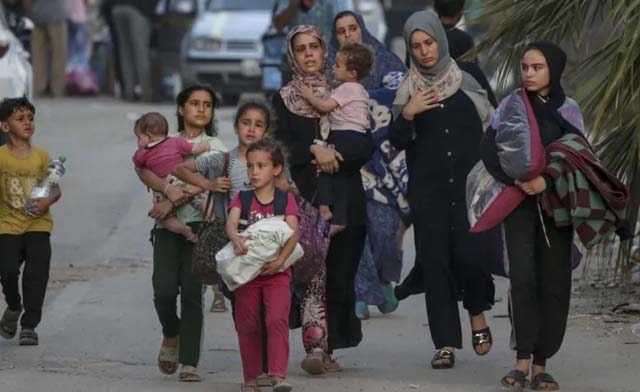
BUREIJ, Palestinian Territories, June 6, 2024 (BSS/AFP) - Israel's military
pounded central Gaza with heavy air strikes on Wednesday as international
talks to secure a truce and hostage release deal resumed.
Tensions were high in annexed east Jerusalem as thousands of police guarded
Israel's annual "flag march" that has sparked clashes between Jews and Arabs
in previous years.
The bloodiest ever Gaza war, sparked by Hamas's October 7 attack on southern
Israel, raged on with jets bombing targets overnight and Palestinian
officials reporting yet more deaths.
Urban combat and shelling intensified in Gaza's southern city of Rafah, while
fighting resumed in central areas. The army announced targeted operational
activity in the areas of Bureij and eastern Deir al-Balah.
Bombardment of central Gaza killed 11 people near the Al-Maghazi camp and two
near Deir al-Balah, said witnesses and Palestinian officials.
Families rushed the wounded, including children, to hospitals where civilians
were once more packing their belongings on pickup trucks and wheelchairs to
flee.
The charity Medicines Sans Frontiers (MSF) said at least 70 dead and more
than 300 wounded, mostly women and children, had been brought to Al-Aqsa
hospital since Tuesday, after "heavy Israeli strikes" in central Gaza.
Karin Huster, an MSF medical adviser in Gaza, described the situation as
"overwhelming".
"There are people lying everywhere on the floor, outside... bodies were being
brought in plastic bags," she said on X.
- Sticking points -
US President Joe Biden on Friday outlined what he called a three-phase
Israeli plan to halt the fighting for six weeks while hostages are exchanged
for Palestinian prisoners and aid is stepped up.
G7 powers and Arab states have backed the proposal, although sticking points
remain -- Hamas insists on a permanent truce and full Israeli withdrawal,
demands that Israel has flatly rejected.
A source with knowledge of the negotiations confirmed to AFP that a meeting
took place on Wednesday "between the Qatari prime minister and head of
Egyptian intelligence with Hamas in Doha to discuss a deal for a truce in
Gaza and the exchange of hostages and prisoners".
Hamas political chief Ismael Haniyeh said Hamas would "deal seriously and
positively" with any offer meeting those demands.
Biden has urged Hamas to accept the deal and deployed CIA chief Bill Burns to
Qatar for a renewed push after months of negotiations.
The source said Burns would "continue working with mediators on reaching an
agreement between Hamas and Israel on a ceasefire in Gaza and the release of
hostages".
Qatar said Tuesday it had yet to see statements from either side "that give
us a lot of confidence", but that it was "working with both sides on
proposals on the table".
Biden earlier told Qatar's emir that "Hamas is now the only obstacle to a
complete ceasefire", and "confirmed Israel's readiness to move forward" with
the terms he set out last week.
A senior Hamas official in Beirut on Tuesday accused Israel of seeking
"endless" negotiations and reiterated the group's position rejecting any deal
that excludes a permanent ceasefire.
Muhammad al-Najjar, a 35-year-old man from northern Gaza twice displaced by
the war, told AFP in Deir al-Balah: "We just want to solve and end the
catastrophic situation that we are living. What matters to us is that the war
made us exhausted, destroyed us and destroyed everything in our lives."
- Flashpoint Jerusalem march -
Israeli police deployed 3,000 officers in Jerusalem ahead of the annual march
by right-wingers commemorating Israel's capture of the Old City in the 1967
Arab-Israeli war.
The march draws Israeli religious ultranationalists and Zionist youth groups
and leads through the city's Muslim Quarter to the Western Wall. It has been
a lightning rod for Israeli-Palestinian tensions in recent years.
The latest Gaza war was sparked by Hamas's October 7 attack on southern
Israel which resulted in the deaths of 1,194 people, mostly civilians,
according to an AFP tally based on Israeli official figures.
Militants also took 251 hostages, 120 of whom remain in Gaza, including 41
the army says are dead.
Israel's bombardment and ground offensive have killed at least 36,586 people
in Gaza, also mostly civilians, according to the Hamas-run territory's health
ministry.
Israel has faced growing diplomatic isolation, cases against it before two
international courts and several European governments, most recently
Slovenia, recognising a Palestinian state.
Amid the Gaza war, tensions have also spiralled elsewhere in the region
between Israel and its allies on the one hand, and Iran-backed armed groups
in Lebanon, Iraq, Syria and Yemen on the other.
The Israeli army and Lebanon's Hezbollah movement have traded near-daily
cross-border fire, causing deaths, forcing mass evacuations and igniting
wildfires on both sides.
Prime Minister Benjamin Netanyahu said on Wednesday that Israel was "prepared
for a very intense operation" along the border with Lebanon and that "one way
or another, we will restore security to the north".
Washington appeared to warn Israel against action on Wednesday, with the
state department saying that any "escalation" there would risk Israeli
security.
"We don't want to see that escalation of the conflict which would just lead
to further loss of life from both Israelis and the Lebanese people and would
greatly harm Israel's overall security and stability in the region," said
State Department spokesman Matthew Miller.
The UN, meanwhile, said it was "obviously very concerned" about tensions
along the border and called on all parties to de-escalate.
The violence since early October has killed at least 455 people in Lebanon,
mostly fighters but including 88 civilians, according to an AFP tally. On the
Israeli side, the army says at least 14 soldiers and 11 civilians have been
killed.